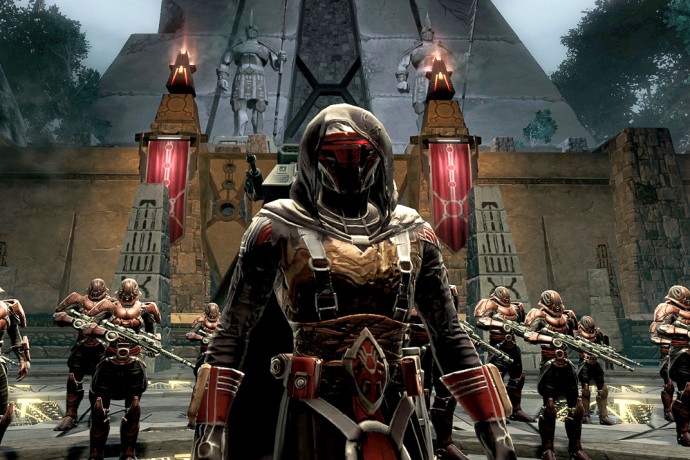A new Star Wars film premieres this week, accompanied by the kind of social ferment usually reserved for presidential elections—or in the case of this year, papal visits.
Beyond George Lucas’ classic trilogy, the Star Wars galaxy also includes books, comics, games, and, of course, toys. While these ancillary products derive their material from the films, they don’t always share the simple morality of the original stories. In the Star Wars films, good and evil occupy a clean binary—there just two sides of the Force: Dark and Light. But in games morality can be as muddled as everyday life, and players must wrestle with both Dark and Light deeds.
We see Star Wars as a staple of imagination and play. For decades, lightsabers—color coded according to the users’ Force affiliation—have been a weapon of choice for children fighting evil and defending the true and righteous republic. Some of those kids grow up and (at least half-) seriously adopt their heroic identities, calling themselves Jedis.
But before the newest trilogy of films could offer a hero’s quest and a chance of redemption to a new generation, the Star Wars franchise hit a snag in its moral status. Recently, the videogame Star Wars: The Old Republic (SWTOR) prompted a debate over torture, the killing of innocents, and the role-playing of evil.
When video games invite players to the Dark Side, does this affect their thoughts or behavior in reality?
Choosing the Dark Side
The controversy began when the Daily Mail ran a piece with the provocative headline: “Hit Star Wars Game Lets Players ‘Own’ and Torment Female Slaves.” Writer Rob Waugh described how SWTOR players could choose to play the game as an evil Sith Warrior, a member of the Empire and enemy of the Jedis—a role that allowed the player to torture a female slave named Vette and to kill innocents with impunity.
The article suggested that players behaved badly within SWTOR, and that this bad behavior might have effects outside the game. Gamers, on the other hand, criticized the article for giving too much weight to the consequences of what is, essentially, a fantasy.
Whether violent videogames influence behavior is an important, and hotly debated, question. But in this case it seemed premature: no one on either side asked what players actually do in the game, or what they really believe. So we did.
Backed by a National Science Foundation grant, we surveyed 369 SWTOR players to identify whether they behaved evilly in the game, what they thought of that behavior, and how it affected their everyday lives. That is, we tried to find out whether gamers really play as evil (or good), how they interpret good and evil acts, and whether they learn anything from their choices. These are important questions, because recent research indicates that immoral behavior in games often teaches lessons about behaving morally outside of them.
We found that, even though the option to torture exists in SWTOR, few players claimed to have exercised it. Those who did torture characters within the game claimed that role-play helped them consider moral questions. SWTOR is not turning players evil, it seems. It may be teaching them what it means to be good.
SWTOR revolves around a conflict between the Empire and the Republic. There are good characters and evil characters on both sides of the war, and players see how their own actions fit into the moral universe of Star Wars. In addition to choosing a faction, players align themselves with the Light Side or the Dark Side of the Force, and points are earned for Light and Dark choices. So playing one alignment or the other consistently leads to rewards. As such, torturing Vette makes sense—if one plays as a Sith Warrior.
Despite the outcry over torture, however, players generally choose the good. Playing as a Sith, one is seemingly destined to cruelty, but many players resist behaving in such a way.
Our survey, which was administered online and advertised in SWTOR forums, engaged three quest lines in which the players can harm innocents. In two out of the three quests, players indicated an overwhelming preference for “good” behavior, but the role-play of the third created more ambiguity. Despite the Daily Mail’s claim that players enjoy torturing Vette, 84% of players who encountered her chose to befriend her instead.
The Daily Mail’s claim that “the option to treat the character decently does not seem to have been enormously popular with the players”—is, therefore, false. In fact, nearly half of all respondents rated the moral acceptability of torturing Vette as a 1 (labeled “not at all acceptable, torture is torture”) out of 5 (“very acceptable, it’s just a game”). Overall, the survey respondents rated the moral acceptability of torturing her as a 2.4 out of 5, even though a Sith Warrior is supposed to torture innocents, given the reward structure of the game, and Vette is not an actual person, just a character in a storyline.
The non-player companions—who adventure with the characters and react to the characters’ choices—offer glimpses into moral decision-making. Players meet a variety of non-player characters (NPCs) in the game. Many of these NPCs give quests or sell things to the players, and some, like Vette, can become the players’ companions. The companions then walk along with the player’s character and protect the player in fights. In addition, they react to the Light/Dark moral decisions the players make, with their own loyalty (and continued service) dependent upon each player’s choices.
It is common for people to treat computers as though they were people, and this is clearly magnified in the accountability systems of SWTOR’s companions. The computer controls the companions—but they accompany the players, fight with them, and respond to the decisions that the players make. The companions will like or dislike players based upon their choices, and thereby affect the players profoundly.
“I find that when I cared about [a companion’s] situation or liked a character’s personality it would remove me from just playing the game the way I want to, which is evilly,” said one survey respondent. “In Vette’s case, I began choosing light side options the more I played with her and cared for her.” Such behavior is common. Another respondent reported, “I’ve heard players say they chose dialogue choice X over Y because they wanted to gain/retain the affection of a particular companion.”
Thanks to the NPCs, players are never truly alone in their choices. They judge themselves as they see the NPCs judging them, and act accordingly; as a result, few players torture Vette, even though doing so is appropriate for Sith.
Although they can make exceptions, many players maintain that evil actions in SWTOR make them uncomfortable. One player explained:
“Playing as an evil warrior, I almost always picked the evil choice. There were a few times though where I just couldn’t bring myself to do it. There was a warrior quest in a cave where some tribal was honoring me with a gift. I had the option to kill him to get dark side points, but didn’t. Very unique for a game to do that.”
Because the Dark Side points are crucial to gaining power for a Sith character, passing up on an opportunity to earn them can be difficult. Another player reported that, “when playing Empire characters, I usually take ‘evil’ options to gain bonuses in that area, even though many times I feel very uncomfortable about it.”
Other players find it almost impossible to choose evil. One respondent said, “I play lightside on all my characters. Going darkside just makes me feel bad.” Another played a Sith Inquisitor and attempted to follow the Dark Side, yet “for some reason, I found myself consistently choosing Light Side choices instead. I just genuinely didn’t like being evil all that much.”
The same respondent applauded the survey and explained, “I personally felt perplexed as to why I had such an aversion to making Dark Side choices since this is just a game.”
The ethics of play
Thanks to the moral dilemmas it poses, SWTOR gives players an appreciation for the importance of ethical warfare.
“There are many ‘grey’ decisions,” said one respondent, “and I think games like these provide players an opportunity to stop and think: ‘what would I do in a similar situation?’ I think the resulting internal discussion is important and beneficial for self-development.” When asked to what extent playing evil makes them feel that real militaries should strive to avoid it, they leaned heavily toward the positive: the single most common answer was a 5 out of 5 (mean score = 3.3).
The players also alleged that playing as good makes them feel that militaries should strive to the same (mean score = 3.3). That is, by playing either good or evil, players feel they learn something about waging a just war. “This game helped me understand the different ethical codes to a greater degree,” comments one. “Given that I attempted to play each class in a specific manner, I found it interesting how certain stories ‘rang’ with me, and others were discordant. It’s an interesting game, and I would almost advocate using it for educational purposes in high school.”
If each player can acquire an embodied, lived experience of cultural ideals through play, then the specific ways of thinking and acting that games engage are of public significance. One player spoke to this when he said: “whenever I do evil things in the game, I feel almost like I’ve actually done evil things, so I keep that to a minimum.” The data above indicate that he is not alone.
In this sense, SWTOR continues the moral and civic project of Star Wars. UT Arlington Professor Mark Lamster argues that the films, “with their transparent plots of good versus evil, were specifically designed to provide a generation of TV-addicted children with a firm ethical grounding.” In SWTOR, players are occasionally allowed to torture, enslave, and kill innocents; that players largely refuse to do so reveals a powerful engagement with morality.
Our data indicate that SWTOR, like other massively multiplayer online games, carries a quasi-religious affect and can be part of modern moral development. In their online gaming, players form communities, debate morality, find meaning, and experience transcendence. The on-the-ground experience of SWTOR is frequently morally progressive, and undermines claims about the supposed evils of online gaming. Star Wars: The Old Republic provides its players with an opportunity to do moral work and envision a more just world even while exploring the darker side of human nature.
All of this is to say that we ought to slow down when we read that videogames teach or encourage morally objectionable behavior. This does not mean we must welcome racist, sexist, or other vicious and socially destructive ideologies—we should continue to question games that railroad players down morally questionable paths.
But patience and consideration is called for when games include violence. Just because a player can (or will) commit a crime of war in a videogame does not mean he or she would do so in real life. Indeed, the truth might be quite the opposite.
As a new generation is raised on George Lucas’s mythology, perhaps the Light Side of the Force will, quite literally, be with them.





